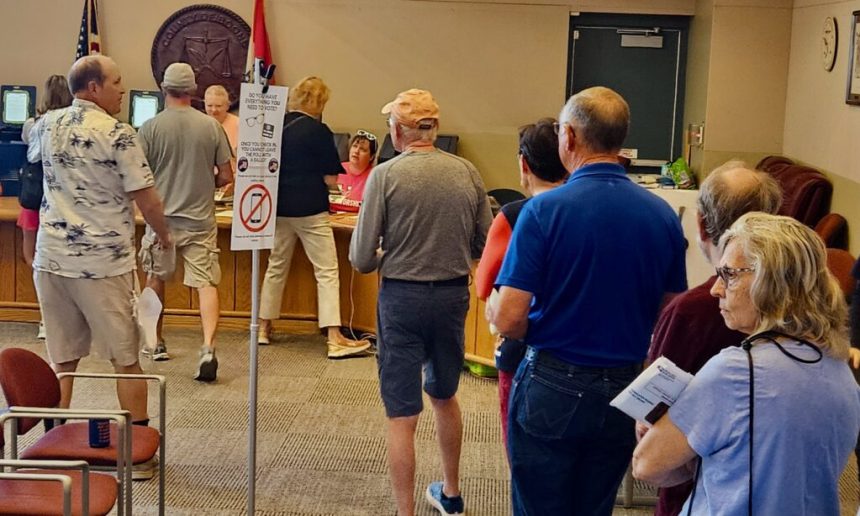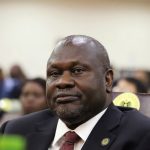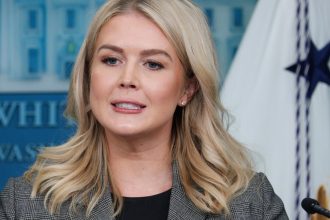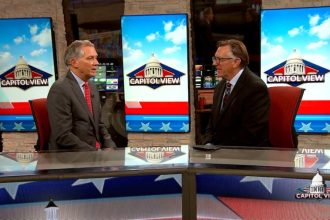Boone County residents line up to vote in October 2024 at the Boone County Government Center in Columbia (Rudi Keller/Missouri Independent).
By mid-December, Missourians will know a lot more than they do now about the fate of the measures passed in this month’s special legislative session.
By that time, signatures are due for the group seeking to force a referendum on the new congressional district map, intended to hand Republicans the 5th Congressional District. Missourians will also be voting at some point next year on new majority requirements for constitutional amendments proposed by initiative, and by that time the political alignments and funding for the upcoming campaign will be clear.
Finally, before the end of the year at least some of the court challenges being heard in Cole and Jackson counties will likely be through the trial courts and in the hands of appeals court judges.
Richard von Glahn, a veteran of four initiative campaigns on minimum wage, is leading the effort to put the new congressional map on the ballot. If the campaign committee People NOT Politicians collects about 110,000 signatures by Dec. 11, the law revising the state’s eight congressional districts will not take effect until there is a statewide vote.
“In less than a week since this map was passed, we’ve had over 2,200 Missourians sign up to volunteer to gather signatures,” von Glahn said. “I’ve obviously been through this a couple times, but I’ve never seen the sort of groundswell we’re seeing now.”
The final verdict on the Legislature’s work will come next year, when voters would see the referendum, if successful, on a statewide ballot. The election would be held in November 2026 unless the General Assembly sets an earlier date.
That is also when voters will act on the measure targeting initiative petitions and perhaps a second proposal on initiatives, proposed by petition, to counter the one passed by lawmakers.
During the 10-day special session, Republican leaders changed the rules and shut down debate in the state Senate to pass the legislation. Now they must face the people, von Glahn said.
“It’s so clearly politicians not focusing on what Missourians want and need, but simply on what politicians want,” he said. “I think you’re going to see a huge outpouring of anger.”
Along with volunteer sign-ups, People NOT Politicians has raised $805,000 for the petition effort, including a $500,000 check from Global Impact Social Welfare Fund, a 501c4 nonprofit that is not required to disclose its donors.
“I feel very confident, and we’re going to turn in the signatures needed by December 11,” he said.
Protesters filled the Missouri Capitol rotunda Sept. 10 in opposition to the gerrymandered congressional district map awaiting Gov. Mike Kehoe’s signature (Annelise Hanshaw/Missouri Independent).
Initiatives campaign
The measure passed by lawmakers to change majorities for initiative proposals will appear on a ballot as Amendment 4. It will go before voters in November 2026 unless Gov. Mike Kehoe sets an earlier election date.
There are two campaign committees ready to oppose it, one supporting it and another trying to get an alternative on the ballot.
It would change the way majorities are calculated for constitutional amendments proposed by initiative petition. Instead of just a statewide majority, initiative proposals would need both a statewide majority and a majority within each of the state’s eight congressional districts.
That would allow as few as 5.3% of voters to control the outcome. Recent election results show that Missouri would not have legal marijuana, Medicaid coverage for working-age adults, sports betting or legal abortions if the proposed new standard were already in place.
The most powerful group, financially, working to defeat Amendment 4 is the Missouri Realtors, who in their internal blogging set themselves apart as a separate political party. They are building a campaign under the name Missourians for Fair Governance.
The Realtors have used the initiative process twice, in 2010 to prohibit sales tax on real estate transfers and again in 2016 to prohibit sales tax on services.
The initiative process safeguards industry and empowers voters to protect their rights, a recent post stated.
“Efforts to weaken it or limit it are bad policy,” the post read. “They threaten the balance between lawmakers and the people they serve, while limiting Missourians’ ability to directly shape laws and constitutional protections.”
There are 25,000 Realtors in Missouri and fundraising by the organization’s PAC shows their financial strength. In the second quarter, the PAC raised $395,000, with donations from 648 realtors or affiliated employees.
Sam Licklider, lobbyist for the Realtors, told legislators in his testimony that the entire network would be activated to work against the initiative changes.
“We have somewhere in the neighborhood of $8,317,000, so we are well-positioned to ensure our arguments reach the public,” Licklider said.
The other opposition committee, in formation, is the Will of the People Coalition. Denise Lieberman, director of the Missouri Voter Protection Coalition, said it will bring together all the groups opposed to Amendment 4.
“The fate of Missouri democracy is on the ballot next year,” Lieberman said.
The committee supporting passage of Amendment 4 is Protect MO Voters, led by Andy Bakker, executive director of Liberty Alliance USA, one of many not-for-profit political organizations backed by the foundation established by the late St. Joseph business owner Stan Herzog.
The proposal on the ballot also bans foreign contributions to Missouri ballot campaigns, something prohibited in a law that took effect Aug. 28, and tightens rules for collecting signatures.
“We look forward to working with a broad coalition of Missourians who want to protect our initiative petition process from signature fraud and safeguard our constitution from foreign adversaries seeking to undermine it,” Bakker said in an email to The Independent.
The name chosen for Bakker’s committee is almost identical to the social media handle and hashtag identifier for Lieberman’s group. She said she expects a lot of traffic to her sites because of the similarity and welcomes the chance to get the opposition message out.
“So if you look up Protect Mo Voters, you’re going to get to the Missouri Voter Protection Coalition, which is working to protect the citizens in this process,” she said.
Bakker, however, said the committee is just adopting the name for the amendment included in the legislation.
“Any confusion is being caused by liberals who oppose these common-sense reforms,” Bakker said.
The measure that will be Amendment 4 goes further in giving a small portion of the state a veto over the whole than proposals in previous years. A measure debated up to the final days of the 2024 session would have required a majority in five of the eight districts.
James Harris, a long-time Republican consultant and lobbyist, backed the 2024 proposal and this year’s measure for clients FGA Action and State Shield. He said the argument that will work best is one highlighting portions of initiative proposals that were not well known at the time of passage.
“Citizens will likely support this ballot measure because it will make common sense to them,” Harris said. “I have sat through focus groups, and when you tell them a little more about what they voted on, they are irritated by what they learn.”
The initiative proposal that would counter the legislative amendment is being circulated by a committee called Respect MO Voters. Instead of making it harder to pass an initiative, it would make it harder for lawmakers to change one after it passes.
Last year, voters approved an initiative that increased the minimum wage and required employers to provide paid sick leave. Republicans in the state Senate shut off debate to pass a bill repealing the paid sick leave and a provision adjusting the minimum wage for inflation that had been law since 2006.
Under the Respect MO Voters proposal, passage of a bill changing anything in a successful initiative would require support from 80% of lawmakers in both chambers and be subject to another statewide vote.
The Republican plan to increase the majority requirement found no support at the 25 town halls the campaign has conducted, campaign director Benjamin Singer said.
“What we kept hearing from people across the political spectrum at these town halls and listening sessions was that they wanted it to be as difficult as possible for politicians to repeal or change what the people decided,” Singer said.
The campaign is operating on a small budget, raising only about $280,000 so far. It is relying heavily on volunteers to circulate petitions, Singer said.
The similarity of names in the coming campaign may confuse voters, von Glahn said, but the issues should not.
“It doesn’t actually matter what political party you come from, Missouri voters like having power themselves. They want things that encourage accountability back to our needs and desires,” he said. “I’m not worried about people being confused by the different things, because a lot of it is actually from the same framework of a power grab by politicians.”
SUBSCRIBE: GET THE MORNING HEADLINES DELIVERED TO YOUR INBOX









